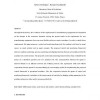315 search results - page 26 / 63 » Reactive Turing Machines |
MPC
2004
Springer
14 years 1 months ago
2004
Springer
Abstract. Erasure of information incurs an increase in entropy and dissipates heat. Therefore, information-preserving computation is essential for constructing computers that use e...
CORR
2007
Springer
13 years 8 months ago
2007
Springer
Abstract. We develop techniques to investigate relativized hierarchical unambiguous computation. We apply our techniques to push forward some known constructs involving relativized...
EAAI
2006
13 years 8 months ago
2006
Throughout the history, the evolutions of the requirements for manufacturing equipments have depended on the changes in the customers' demands. Among the present trends in th...
RAS
2010
13 years 7 months ago
2010
Grasping an object is a task that inherently needs to be treated in a hybrid fashion. The system must decide both where and how to grasp the object. While selecting where to grasp...
ATVA
2007
Springer
14 years 2 months ago
2007
Springer
Fault tree analysis is a traditional and well-established technique for analyzing system design and robustness. Its purpose is to identify sets of basic events, called cut sets, wh...

